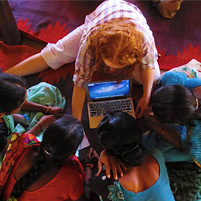Social Change

The semester-long trip was expected to provide opportunities for them to change the world. What the students didn't expect was how the trip would change them.
During Carnegie Mellon University's first Social Change Semester, 10 students traveled to Qatar and India where they worked on projects in education, water management, alternative energy, women's empowerment, sustainable agriculture and village industries.
"We're a family. And as the semester progressed, our family just kept getting bigger." said Nico Slate, associate professor of history in CMU's Dietrich College of Humanities and Social Sciences. Slate co-led the trip with his wife, Emily Mohn-Slate, a special instructor in CMU's English Department.
The students who participated last spring are pursuing majors that range from information systems and biology to global studies and business administration.
The group spent time in Doha, Qatar, working with CMU-Qatar students to teach English to migrant workers from South Asia. They also spent time in rural central India and Chennai, one of India's largest cities, where they led programs designed to help underprivileged children learn how to become leaders.
Most of the projects they engaged in were projects of the Kamalnayan Jamnalal Bajaj Foundation, which was co-founded by the parents of CMU trustee Kushagra Bajaj (TPR'97).
"The villagers we helped became our friends and teachers," Slate said. "All that we learned and did was a result of the relationships we built with our partners, especially the Bajaj Foundation, the Avanti Fellows and Visions for Global Empowerment."
Marcy Held (DC'13) was surprised by all the things they were able to do, from tutoring to partnering with NGOs to making a website.
"I learned that we can't always control how much time we will have in a certain situation, but we can control how we allow that time and those experiences to affect who we choose to become and how we decide to be in the world," Held said. "The experience was a lot of work, but everything fit together and ended up being really great."
Alexandria Hernandez (DC'15) saw the experience as an opportunity to go beyond what she was learning in her textbooks. It was her first time outside of the United States.
"It was powerful. I was able to interact directly with people I wanted to serve in order to figure out their needs firsthand and determine how to accomplish change," Hernandez said.
She recalled one student in a leadership workshop she conducted who struggled with self-confidence.
"The young girl had an overwhelming fear of not being smart enough to be effective," Hernandez said. "I helped her to overcome that. I taught her how to take good notes, and pointed out her progress as she made it. What she needed was a cheerleader, and I am grateful I was able to be that for her."
Slate said he hopes the semester can serve as a model for future service-based semesters abroad — at CMU and elsewhere. If they can get the funding, Slate said he and his wife would love to make the Social Change Semester experience available to students on an ongoing basis.
"A lot of us went into the semester thinking we were going to change the world and do these fantastic service projects," Hernandez said. "But in a lot of ways, the experience changed us."
Related Links: Read Blogs: CMU Social Change Semester | About Social Change Semester | Dietrich College | Study Abroad Opportunities
